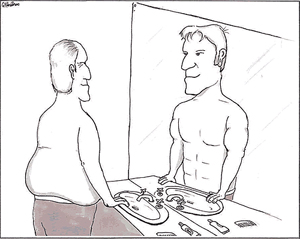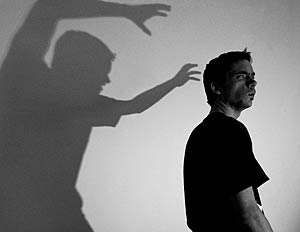Sticks and Stones
“What other people think of you is none of your business.”
In the course of carrying Touch Practice, I have been made into a hero, and I have been made into a villain.
 In the first category, some have attributed almost guru-like qualities to me, claiming me to be a teacher, or someone divinely inspired. Many have told me I have changed their lives. People have accused me of being egoless, generous beyond measure, some version of Amma, the modern hugging saint, a selfless, kind, loving hugger of those who need to be hugged. “A guy who holds wounded soldiers. What’s not to like?” Once, when I was demonstrating a one-hour Touch Practice, holding a volunteer in front of a group of observers, one of the audience members was asked, “what did you see,” and he replied, “I saw God.”
In the first category, some have attributed almost guru-like qualities to me, claiming me to be a teacher, or someone divinely inspired. Many have told me I have changed their lives. People have accused me of being egoless, generous beyond measure, some version of Amma, the modern hugging saint, a selfless, kind, loving hugger of those who need to be hugged. “A guy who holds wounded soldiers. What’s not to like?” Once, when I was demonstrating a one-hour Touch Practice, holding a volunteer in front of a group of observers, one of the audience members was asked, “what did you see,” and he replied, “I saw God.”
 In the second category, some have accused me of darkness and deception, a man who lures innocents into vulnerability so that I can take advantage of them. I have been described as (this is my favorite) “an angry lesbian” who is bent on feminizing men and making them more like women, someone with a hidden sexual agenda, holding some demonic power to turn straight men gay. People have accused me of being driven by my own ego, getting my own physical needs met surreptitiously by others under the guise of “giving” them something, someone who claims to be engaged in spiritual practice but really just wants to “cop a feel.”
In the second category, some have accused me of darkness and deception, a man who lures innocents into vulnerability so that I can take advantage of them. I have been described as (this is my favorite) “an angry lesbian” who is bent on feminizing men and making them more like women, someone with a hidden sexual agenda, holding some demonic power to turn straight men gay. People have accused me of being driven by my own ego, getting my own physical needs met surreptitiously by others under the guise of “giving” them something, someone who claims to be engaged in spiritual practice but really just wants to “cop a feel.”
It’s often pleasurable to hear from people in the first category, and often uncomfortable to hear from those in the second, but all of this, in both paragraphs, is utter bullshit. None of this has anything to do with me. I am none of any of those things, neither God nor villain.
What I am is a regular guy who has somehow managed to develop a template, a “space,” onto which men can project their greatest hopes and their worst fears. And that’s what you see realized in those first two paragraphs: men’s greatest hopes of their highest, best, most generous, most loving, open, idealized selves, and men’s deepest fears of their worst, most cruel, most evil intentions, most devious self-deceptions.
When I sit with someone for an hour, we create a space that calls forth your greatest hopes and your worst fears, and if you’re like most of us, you’ll get both. And if you run into something you can’t handle, you’ll project it outside of yourself somewhere. If you’re looking for someone handy, you’ll project it onto me. I’m a great target, especially as an anonymous online presence.
As far as how we deal with ourselves, we tend to like the first category (our heroic, best self) more than the second (our devious, self-deceived little shit.) Often when we go looking for spiritual practice we go searching for the first but slam right into the second. We go away on silent retreat to become deeply spiritual, centered and zen-like and in the middle of day two we are ready to run screaming from the retreat center in search of the nearest bar. Or we begin a fast to purify and cleanse our bodies and eight hours later tear into a bag of Ruffles (yeah the kind coated with cheddar-cheese-flavored-chemical-dust, you know, the “Ruffles Cleanse.”) We sit down with a partner to try to tell them in the most loving and spiritual way that they are doing something irritating, and while we approach with loving intent, we end up five minutes later yelling at each other.
 Touch Practice is a mirror. If people see me as heroic it is only because they are in touch with their own capacity to be heroic and they recognize it in me. The hero in me calls to the hero in them, and they respond. The source of that behavior is outside both of us; it comes to us, comes through us, we are more conduits than generators. We carry it; we don’t invent it.
Touch Practice is a mirror. If people see me as heroic it is only because they are in touch with their own capacity to be heroic and they recognize it in me. The hero in me calls to the hero in them, and they respond. The source of that behavior is outside both of us; it comes to us, comes through us, we are more conduits than generators. We carry it; we don’t invent it.
And if people see me as deceptive, it is because they are in touch with their own capacity to deceive and they recognize I have that capacity too. If they’re very well in touch with themselves, relatively healthy and self-aware, they will have already explored their own capacity to be deceptive, when and where and how they tend to do that, how it manifests. If they know their deceptive selves well, they won’t be too upset by the idea that there’s a piece like that in everyone. Knowing (and loving) the ugly side of the self is part of loving the self, and part of any mature, comprehensive spiritual practice.
 But if a person is only subconsciously aware of his capacity for self-deception, he will often construct a witch hunt, where he’s the only honest guy in a world full of cheaters, liars and thieves. You can see this construction really well in famous collapses of the egoic shadow around people like Richard Nixon, Eliot Spitzer, Roy Cohn, Jimmy Swaggart, J. Edgar Hoover, and many others. These were guys obsessed with what others are “hiding” because they were so completely driven by what they themselves were hiding that they literally couldn’t see straight.
But if a person is only subconsciously aware of his capacity for self-deception, he will often construct a witch hunt, where he’s the only honest guy in a world full of cheaters, liars and thieves. You can see this construction really well in famous collapses of the egoic shadow around people like Richard Nixon, Eliot Spitzer, Roy Cohn, Jimmy Swaggart, J. Edgar Hoover, and many others. These were guys obsessed with what others are “hiding” because they were so completely driven by what they themselves were hiding that they literally couldn’t see straight.
What have I learned from all this? Lots, but here are the basics:
- Know yourself. You are both hero and villain. Find both. Love both. (Villains, in particular, do better when they are well loved and taken care of.) Find your corrupt, self-deceived, evasive, dishonest-little-shit-of-a-self in there and take him out for tea and let him know you love him. Tell him he can come out. Look at him. Get to know him. Be his friend. Help him.
- Own your projections. Find someone you intensely admire, someone you look up to. In what ways is that person a version of your “best self?” What do you share in common? What latent, undeveloped side of you recognizes greatness there? Those feelings of intense admiration are a form of recognition: “the part of me that is like that recognizes the part of him/her that is like that.” Reach out to that part of yourself. Take it out for tea. Get to know it.
- Watch for exaggeration. Men are loving and hateful, good and bad. Although we have the capacity to develop through choice and practice, we have capacity for both. Whenever you start making someone “too good to be true” or “the epitome of evil” it’s a symptom that there’s likely projection in the room. What is it that’s so heroic inside of you (or so scary) that you can’t own it yourself? What is it that needs to be “pinned” on someone else because it’s too much for you to see?
Be patient. Work gently. This is lifetime work; you’re not going to finish this week. Gently coax the hidden pieces of yourself out into the light, the good, the bad, the ugly, it’s all lovable, and it all responds to love.
There are four spaces still available in the Spring 2014 Asheville retreat!
Click here for more information!
Have thoughts you’d like to share?
Touch Practice is a sacred practice for me, and part of that is keeping confidences sacred. While a name and e-mail address are required to post a comment, feel free to use just your first name, or a pseudonym if you wish. Your e-mail address will never be seen by or shared with anyone. It is used to prevent spam and inappropriate comments from appearing in the blog. I’d really like to hear from you!














Kevin:
Often our fears project as anger towards other we don’t understand or that appear to be a threat. Since childhood we start developing walls or protectors to keep us from danger or pain. Unfortunately those walls and protectors also keep us from love and happiness. I can’t attend the Ashville retreat although there is nothing I would like more than that, I have a great friend close to Ashville and the city itself is great, I have been there before with my friend. I am looking for a retreat in Houston, Texas.
Going back to the topic of touch, I have experienced amazing times while holding someone else, my children, spouse and friends. Most men are terribly afraid of touch except during sports, but calm, tender touch can be so spiritual and fulfilling.
Please consider me a “new” friend and let me know when you will be able to come to Houston.